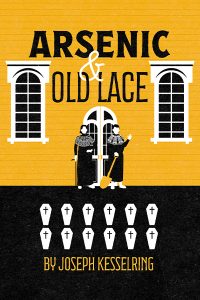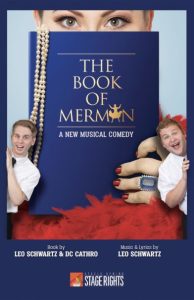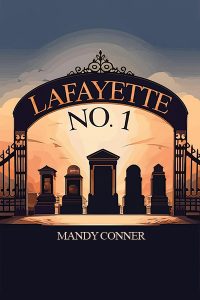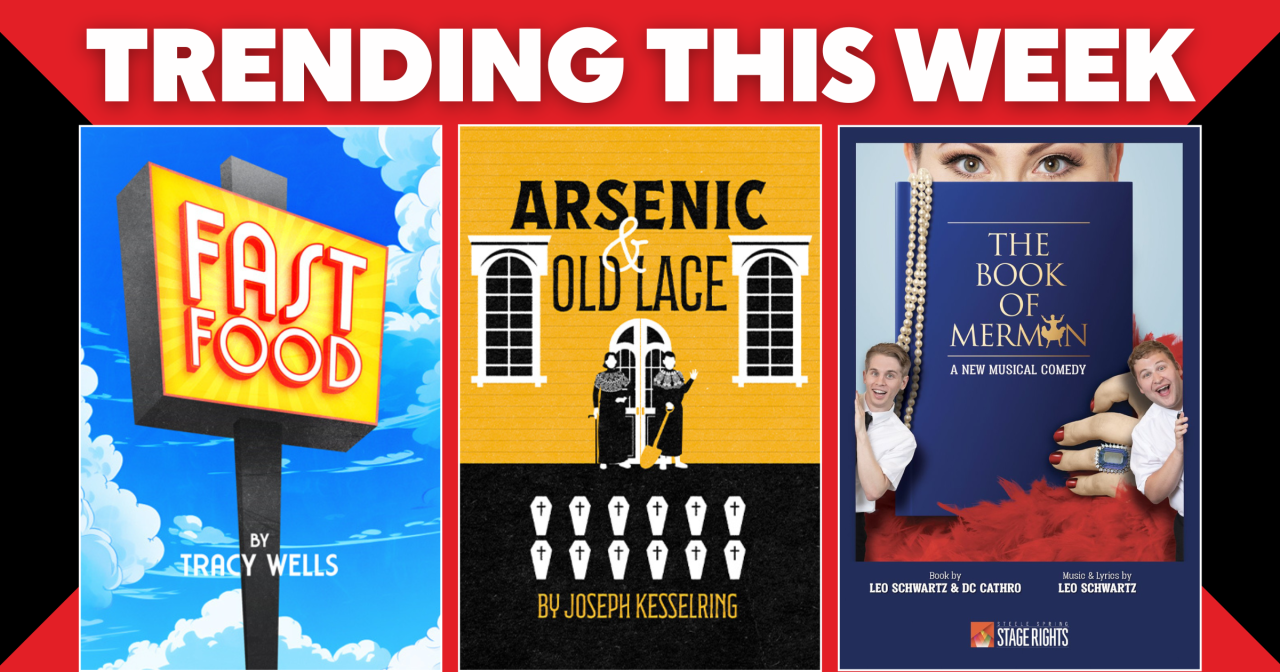What’s trending at Broadway Licensing Global? Check out this week’s most popular plays and musicals from Broadway Licensing, Dramatists Play Service, and Playscripts.
Top 5 Trending Plays & Musicals
 Arsenic and Old Lace by Joseph Kesselring
Arsenic and Old Lace by Joseph Kesselring
Drama critic Mortimer Brewster’s engagement announcement is upended when he discovers a corpse in his elderly aunts’ window seat. Mortimer rushes to tell Abby and Martha before they stumble upon the body themselves, only to learn that the two old women aren’t just aware of the dead man in their parlor, they killed him! Between his aunts’ penchant for poisoning wine, a brother who thinks he’s Teddy Roosevelt, and another brother using plastic surgery to hide from the police—not to mention Mortimer’s own hesitancy about marriage—it’ll be a miracle if Mortimer makes it to his wedding. Arsenic and Old Lace is a classic black comedy about the only thing more deadly than poison: family.
 The Book of Merman Book by Leo Schwartz & DC Cathro, Music & Lyrics by Leo Schwartz
The Book of Merman Book by Leo Schwartz & DC Cathro, Music & Lyrics by Leo Schwartz
Two Mormon missionaries knock on the door of Ethel Merman and hilarity ensues in this clever new musical comedy. Audiences will fall in love with this heaven-sent journey about two men and “The Merm” with a witty original score and a heartfelt message about being true to yourself. You gotta admit— it’s way more fun than Sunday School!
 Lafayette No. 1 by Mandy Conner
Lafayette No. 1 by Mandy Conner
As the yellow fever epidemic ravages the streets of 1816 New Orleans, no one thinks of the orphans known as the Forgotten—except for Lizzie Landry. Lizzie brings bread from her mother’s kind employer to the band of homeless youths she’s befriended, even though local police and politicians consider them nothing but a nuisance. But when the epidemic entangles Lizzie’s fate with those of the Forgotten, they all must band together to hold the city accountable for their most vulnerable citizens. A haunting and immediate historical drama.
 The Shark Is Broken by Ian Shaw and Joseph Nixon
The Shark Is Broken by Ian Shaw and Joseph Nixon
The first summer blockbuster movie is being filmed—but no one working on the film would know it. Dive deep into the tumultuous, murky waters of the making of a major motion picture with testy, feuding costars, unpredictable weather, and a shark prop whose constant breakdowns are looking like an omen for the future of the movie. In this comedy co-written by Ian Shaw and Joseph Nixon, the short tempers of Jaws stars Robert Shaw (father of co-writer Ian), Richard Dreyfuss, and Roy Scheider take center stage as they bond, argue, drink, gamble, and pray for an end to the shoot, not knowing it will change their lives forever.
 Fast Food by Tracy Wells
Fast Food by Tracy Wells
When you’re hungry for hilarity but short on time and tight on budget, where do you turn? Why, the one-act play Fast Food, of course! From crazy customers to screwy staff, this vignette-style collection of scenes will satisfy your craving for fast food fun while offering a simple set and an entirely flexible and expandable cast.





